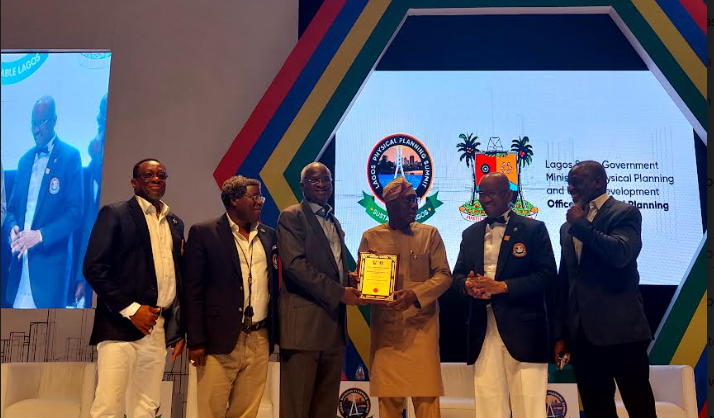“ISSUES AND PROSPECTS OF LAGOS AS AFRICA’S MODEL MEGA CITY,” BEING SPEECH OF H.E BABATUNDE RAJI FASHOLA SAN AT THE MAIDEN LAGOS PHYSICAL PLANNING SUMMIT AT EKO HOTELS & SUITES , VICTORIA ISLAND ON TUESDAY, 15TH OCTOBER 2024
The question I asked when I got this invitation was, “Why should we be talking when we all know what needs doing?” Of course, as to be expected, one of the most respected town planners, Mr. Toyin Ayinde, was the emissary of the organizers, and here we are.
As a town planner, he argued, there is still a lot to talk about, even if it is to remind ourselves of what remains to be done.
So, I will christen this a Summit of Reminders.
My first reminder is about the “Mega City.” People who do not know have asked me where it is: I have always said it is a status, not a destination.
Unlike city states like Liechtenstein and Iceland with populations of 40,000 and about 400,000 approximately, Lagos has over 20 million people. This is what makes it mega.
My thesis about planning is that that the town planner, the Transport Planner and economic planner are the most important personnel or officers of any government.
Regrettably, as one of my mentees put it in a recent discussion, the town planner in this environment has been less vocal, if not diffident, compared to other professionals.

While other professionals even in the built environment are more visible, the Town Planner who should decide how others conduct themselves should step forward.
But how really important is the town planner? In my view, the vision and actions of our town planners, their leadership and dedication, determine whether we are poor or rich.
This is in part because nature has been as kind to us, if not kinder than most, in the land resources and assets such as rivers, oceans, creeks, and other landforms that we have.
How we have used these resources is partly a function of how the planners have acted or failed to act. The role of our town planners, as I envision it, is to determine how these assets are used for our optimum benefit and common prosperity.
The town planner should, in my view, lead us in determining what parts of the land provide roads, schools, markets, places of worship, health facilities, recreation facilities, waste and water treatments, before deciding what is left for dwelling.
If this is done, we would avoid the current situation where people first take land for dwelling, and then there is no land to build the roads to get to the houses.
There is a prime real estate in this state that exemplifies this. There is only one narrow road for ingress and egress. It should not surprise us, therefore, that we often have winding and twisting roads while other jurisdictions have straight roads.
The Town planner, I must remind us, determines where our water supply, power supply, and other utilities are to be located. In my view, it is their job to use the population numbers provided by the economic planner to determine how much water and power we need and how much waste we’re likely to generate in order to plan how these are provided and where they will be located.
As I speak, a question to ponder is: How many new cemeteries have been built in Lagos since independence? I challenge the town planners to start responding to this glaring deficit because death is certain after life.
If the town planners decide on these critical development plans, including rail as Lagos has done, it is the responsibility of the economic planner to put costs and financial numbers to them. This will form the basis of budgets from year to year that the finance team and treasury departments have to raise money for.
Since there is a persuasive view that this conversation can be useful if only it reminds us of the things we already know, let me pivot to a few reminders:
Lagos State passed a far-sighted and visionary planning law around 2010 which created a Building Control Agency to ensure, amongst other things, that buildings were constructed in conformity with the approved plans and that there were no deviations from specifications to ensure that they did not collapse during or after construction. Sadly, that stigma of non- compliance still remains with us. Buildings still collapse during and after construction. A major religious building collapsed in the twilight of my administration, and there have been no reported consequences in spite of a coroner’s inquest and report.
In preparation for efficiently managing our mega status, we developed 9 (NINE) model city plans for Lagos. They will require updating because planning is dynamic, but the implementation of those plans must not be forsaken, otherwise we gather here in vain.
The Adiyan Water Works Phase 2 needs to be urgently concluded and new ones planned and implemented to ensure that Lagos is a functional mega city.
We must not forget to complete the Epe waste collection and recycling plants and finish the work at Olusosun in order to retain our ability to manage our waste.
I must acknowledge the administration’s efforts in completing about 17 different housing estates but urge that new ones must be commenced.
In addition, I think that part of the transport planning efforts must include the opening of new cities and district offices of government in Epe, Badagry, Ikorodu, and our satellite towns to reduce the centralization of activities in Alausa and therefore redistribute traffic and decongest the city.
Technology now makes it possible to connect all these offices to Alausa and make them function seamlessly.
I must also commend the current administration for advancing the work on the Blue and Red Line and initiating work on the Green Line as is now being reported.
But while these works go on, we cannot abdicate our state’s far-reaching work on the Bus Rapid Transit (BRT) as the first in Africa. We must reclaim the BRT from the tyranny of tricycles and minibuses while expanding our waterways capacity in order to achieve our intermodal transport objective.
Let me be clear, the proliferation of motorcycles, tricycles, and minibuses on Lagos roads are in clear conflict with many commitments we have made on climate change because of their high greenhouse gas emissions, and our partners across the world will be watching with concern.
Most of these matters I have discussed relate to the past or present? What about the future?
Today, the world is rewarding talent in an unprecedented way. Entertainment by way of music, theatre, sports, and related fields are the new ways of livelihood for young people and also the projection of national strength.
The town planner must now be thinking of where our new stadia, concert arenas, film studios, performance and convention centres will be.
These are the required infrastructure for the expression of talent and the creation of jobs to respond to youth unemployment challenges.
These will also facilitate the state’s capacity to leverage on M.I.C.E tourism which is the acronym for Meetings, Incentives, Conferences and Exhibitions.
As the country starts to expand our interstate road and rail network, I think the planner must begin to envision the development of new housing estates and settlements within a few kilometres of each rail station and major Federal Highway interchange.
These estates must, in my view, include mini stadia, concert arenas, town halls, and similar recreational activities. These are the ingredient parts of the state development plan to be executed in phases from administration to administration.
Often people tell me there is no money. But my response is always to ask if there is a plan?
If there is a good plan, money will follow it. This state, like no other subnational, has demonstrated its creditworthiness with the financial sector and has raised many successful bonds against the odds. She can do it again to fund a viable development plan.
Lagos can now also raise private sector funding for some stand-alone projects like water Treatment plants, Rail Line and the likes as distinct from general bonds.
Related to talent development is general tourism. From Badagry to Epe, this state has a peninsula bordered by the Atlantic Ocean and the lagoon of about 100 kilometres. This is not different from the assets that Cancun in Mexico and Sharm El Sheikh in Egypt have turned into global tourist destinations.
Now that the Federal Government has committed to the Lagos-Calabar coastal highway, I would like to know what the Lagos town planners envision for this corridor as a major tourist destination from Victoria Island to Epe and prolific income generator and employment centre.
From Ilashe to Inagbe, to Ilado, to Iru, Epe, and beyond, prosperity is knocking on our doors, and our town planners must lead us to embrace it.
While I am optimistic that the appropriate development plans will evolve, translating a plan to development
involves many considerations, especially investment considerations and business decisions.
All of us are witnesses to how a $20 billion investment in the petroleum sector left one state for another; and it can happen again either way, if the business investment climate is not consciously and productively managed.
Therefore, in this our meeting of reminders, let us remind ourselves that there were previous commitments in Lagos to improve the process of issuance of development and building approvals.
A process that takes two years to respond to an investor’s request for planning approval is sending that investor away.
Payments for processing requests for building approvals must be reasonable and seen as administrative costs only and no more.
Payments for planning approvals must not be seen as revenue. Such payments are not sustainable as a revenue source. The revenue comes from land use charges when the development is completed, withholding taxes that accrue from rent if they’re rented, and the VAT if they’re commercial, along with the personal income taxes if people are employed there.
In order to maximize the possibilities that proper town planning administration can deliver, it is important to streamline the number of agencies involved in the process as a deliberate ease of doing business initiative. The more complex the process and the more expensive, the cost, the less attractive it becomes for businesses.
Ladies and gentlemen, these are some of the reminders I can think of within the context of time on the theme of the summit. I hope they help to set the stage for other eminent contributors who will not only stimulate our collective memories but also inspire us about emerging possibilities in the profession.
I wish you all very fruitful deliberations and thank you for listening.



